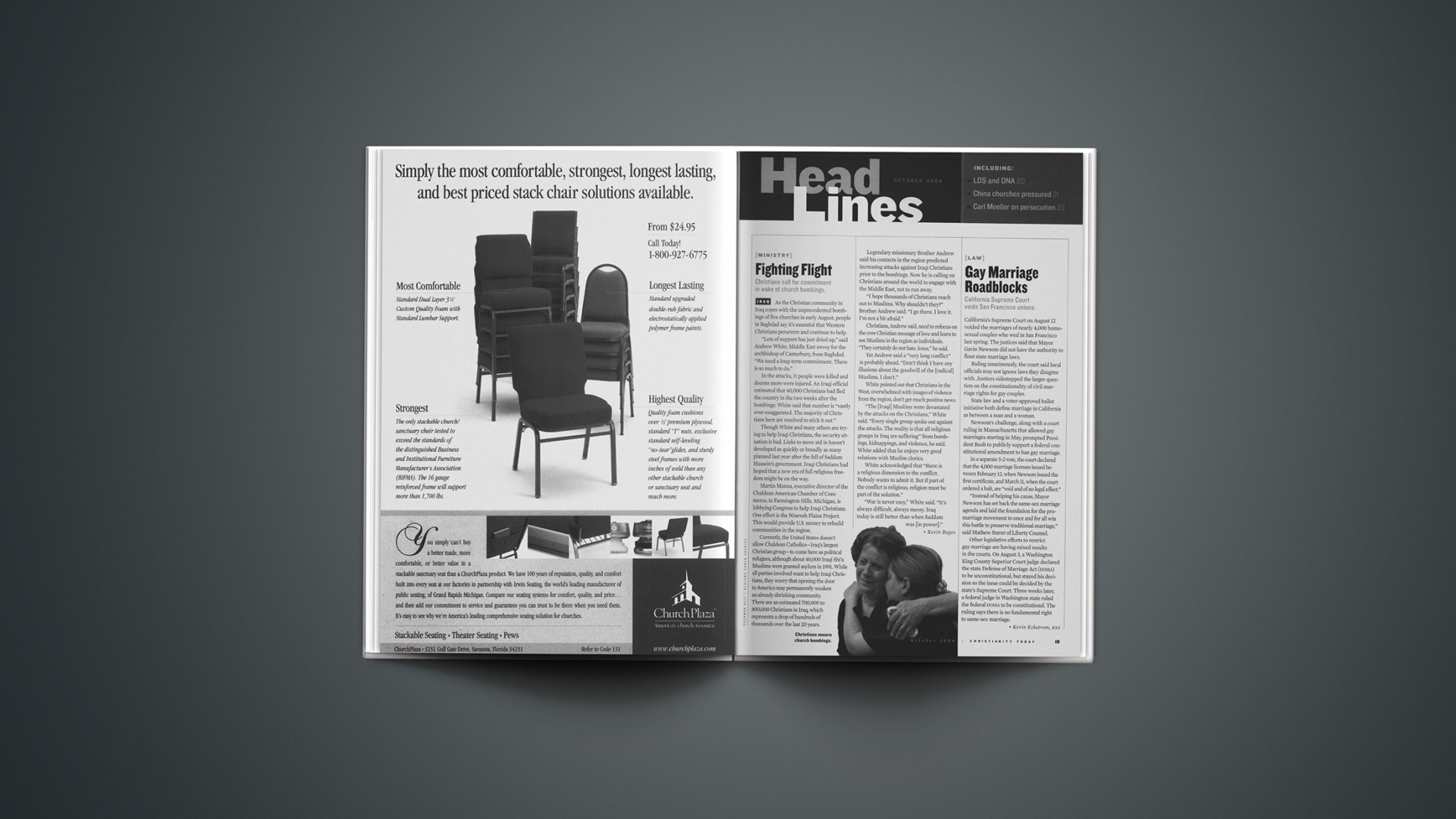As the Christian community in Iraq copes with the unprecedented bombings of five churches in early August, people in Baghdad say it's essential that Western Christians persevere and continue to help.
"Lots of support has just dried up," said Andrew White, Middle East envoy for the archbishop of Canterbury, from Baghdad. "We need a long-term commitment. There is so much to do."
In the attacks, 11 people were killed and dozens more were injured. An Iraqi official estimated that 40,000 Christians had fled the country in the two weeks after the bombings. White said that number is "vastly over-exaggerated. The majority of Christians here are resolved to stick it out."
Though White and many others are trying to help Iraqi Christians, the security situation is bad. Links to move aid in haven't developed as quickly or broadly as many planned last year after the fall of Saddam Hussein's government. Iraqi Christians had hoped that a new era of full religious freedom might be on the way.
Martin Manna, executive director of the Chaldean American Chamber of Commerce, in Farmington Hills, Michigan, is lobbying Congress to help Iraqi Christians. One effort is the Nineveh Plains Project. This would provide U.S. money to rebuild communities in the region.
Currently, the United States doesn't allow Chaldean Catholics—Iraq's largest Christian group—to come here as political refugees, although about 40,000 Iraqi Shi'a Muslims were granted asylum in 1991. While all parties involved want to help Iraqi Christians, they worry that opening the door to America may permanently weaken an already shrinking community. There are an estimated 700,000 to 800,000 Christians in Iraq, which represents a drop of hundreds of thousands over the last 20 years.
Legendary missionary Brother Andrew said his contacts in the region predicted increasing attacks against Iraqi Christians prior to the bombings. Now he is calling on Christians around the world to engage with the Middle East, not to run away.
"I hope thousands of Christians reach out to Muslims. Why shouldn't they?" Brother Andrew said. "I go there. I love it. I'm not a bit afraid."
Christians, Andrew said, need to refocus on the core Christian message of love and learn to see Muslims in the region as individuals. "They certainly do not hate Jesus," he said.
Yet Andrew said a "very long conflict" is probably ahead. "Don't think I have any illusions about the goodwill of the [radical] Muslims. I don't."
White pointed out that Christians in the West, overwhelmed with images of violence from the region, don't get much positive news.
"The [Iraqi] Muslims were devastated by the attacks on the Christians," White said. "Every single group spoke out against the attacks. The reality is that all religious groups in Iraq are suffering" from bombings, kidnappings, and violence, he said. White added that he enjoys very good relations with Muslim clerics.
White acknowledged that "there is a religious dimension to the conflict. Nobody wants to admit it. But if part of the conflict is religious, religion must be part of the solution."
"War is never easy," White said. "It's always difficult, always messy. Iraq today is still better than when Saddam was [in power]."
Copyright © 2004 Christianity Today. Click for reprint information.
Related Elsewhere:
Weblog also reported on the church attacks and the aftermath, and Uwe Siemon-Netto said they defy Muhammad's wish for the Iraq's millennia-old Christian community.
We also have a full coverage area for the Iraq war. Other Christianity Today coverage on Iraq includes:
Iraq's Church Bombers vs. Muhammad | Attacks defy the Prophet's wish for the area's millennia-old Christian community, which is now on the edge of oblivion. (Aug. 06, 2004)
Emerging from the Shadows | House-church Christians start renting buildings, and dream of evangelism. (March 11, 2004)
Iraq's Good Samaritans | This past summer, pundits predicted that Iraqis would resent Franklin Graham's ministry. What really happened when the workers showed up? (Oct. 24, 2003)
Daring to Dream Again | Chaldean Christians connect with other believers. (July 14, 2003)
Damping the Fuse in Iraq | A veteran peacemaker discusses how religion can help stave off religious conflict after Saddam. (July 09, 2003)
The Mother of All Liberties | Full religious freedom for Iraq is not negotiable. (June 2, 2003)
No Strings Attached | Christians seek to balance relief work and evangelism in Iraq. (May 20, 2003)
Mercy in Baghdad | North Americans endure bombing to chronicle the war's effects on civilians. (May 7, 2003)
Before the Refugee Dam Breaks | Agencies prepare to help up to 900,000 people in Iraq War. (April 24, 2003)
Apocalypse Again and Again | The Bible doesn't tell us when to go to war but how to live in a war-ridden world. (April 16, 2003)
As Baghdad Falls, Agencies Brace for Flood of Work | Aid and mine removal teams could move into Iraq within days. (April 11, 2003)
Mixing Iraq Aid and the Gospel Stirs Debate | Critics say proselytizing can reflect negatively on other relief groups and governments. (April 04, 2003)
Evangelicals Plan to Minister to Iraqis' Needs—Physical and Spiritual | Evangelism efforts will join relief work, say Southern Baptist Convention and Samaritan's Purse (March 27, 2003)
Relief Agencies Prepare to Help Iraqi Refugees | Meanwhile Christians in Baghdad fear the worst. (March 26, 2003)
Keeping Their Heads Down | Vital but dwindling Christians face many pressures. (Nov. 8, 2002)
Death by Sanctions | Iraqi Christians persevere in spite of Saddam Hussein and 10 years of an economic embargo. (Oct. 2, 2000)









